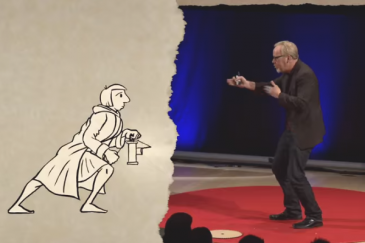The simplest questions can carry you to edge of human knowledge, says Adam Savage, as he discusses the incredible scientific discoveries that came from simple, creative methods that anyone could have followed.
However brilliant any of us are with our brains, the one thing we can't do is control what kinds of information it picks up and holds on to. I, for example, don't remember a single thing I learnt in my first-year university philosophy classes, except that once my lecturer compared these honey tubes to a sphincter.
Unless I somehow end up with a career in packaging design, that information isn't going to help me much. But for American theoretical physicist Richard Feynman, a little something his father once said to him prompted him, many years later, to answer several fundamental questions about the physics of the Universe.
When a young Feynman was walking with his dad one day, his little wagon in tow with a ball inside, Feyman asked why the ball would move to the back of the wagon every time the wagon was pulled forward. His dad said, "That's inertia." When young Feynman asked what inertia was, his dad said, "Inertia is the name that scientists give to the phenomenon of the ball going to the back of the wagon." He was obviously joking, but went on to tell his son, "In truth, no one really knows."
This little conversation with his father is what convinced Feynman that the simplest questions can take you to the edge of human knowledge, says Adam Savage in his TED talk, which is where he made his most groundbreaking discoveries.
Watch Savage's awesome talk above, where he goes on to discuss how Eratosthenes' calculation of the Earth's circumference in 200 BC and Hippolyte Fizeau's measurement of the speed of light in 1849 came from surprisingly humble beginnings. It's pretty inspirational stuff.
Source: TED-Ed
